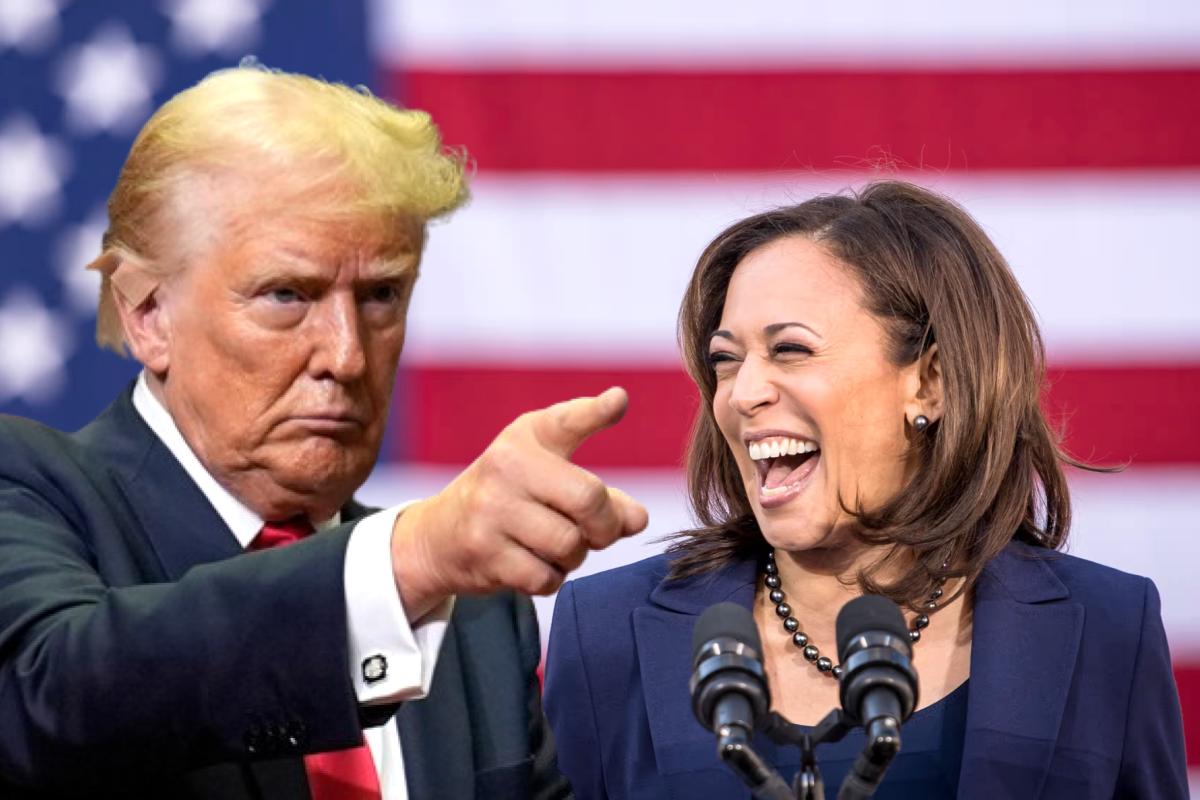Republican presidential candidate Donald Trump asserted on Sunday that he believes Vice President Kamala Harris will be a more manageable opponent in the upcoming election compared to Democratic President Joe Biden, who earlier withdrew as his party’s candidate.
“Harris will be easier to beat than Joe Biden would have been,” Trump told CNN.
Later, Trump and his campaign took to social media to attack both Biden and Harris, asserting Biden’s unsuitability to continue as president. Biden endorsed Harris to replace him as the Democratic nominee.
Biden’s reelection campaign ended on Sunday amidst concerns within the Democratic Party about his mental acuity and ability to compete against Trump. These doubts were exacerbated by Biden’s lackluster performance in a recent televised debate against Trump.
On his Truth Social platform, Trump criticized Biden, stating, “He was not fit to run for President, and is certainly not fit to serve.”
Other prominent Republicans, including House Speaker Mike Johnson, echoed these sentiments, calling on Biden to resign, citing his withdrawal as the Democratic candidate for president.
Trump’s campaign had already begun strategizing on reallocating campaign resources in light of Biden’s withdrawal, anticipating potential changes in the Democratic ticket. They expressed confidence in facing Harris, intending to associate her with Biden’s policies, particularly on immigration and inflation.
In a statement following Biden’s exit, the Trump campaign labeled Harris as Biden’s “enabler in chief,” asserting there is no distinction between their records.
The Republican National Committee released a video criticizing Harris’s stance on immigration, despite her not having direct responsibility for border security.
In recent weeks, Trump and his allies have preemptively attacked Harris amid speculation that she might lead the Democratic ticket in 2024.
In March 2021, Biden tasked Harris with leading efforts with Mexico and Central American nations to address illegal immigration. Republicans have since criticized her for not curbing illegal migration, despite her indirect involvement in border security.
Following Kamala Harris’s selection as Joe Biden’s running mate in August 2020, Donald Trump criticized her, calling her “totally unlikable” and even labeling her a communist. He went so far as to repeatedly refer to her as “this monster”. The use of “monster” is not just dehumanizing but also carries a racist undertone, suggesting a collective agreement that she is an outsider or other.
Trump also deliberately mispronounced her name, emphasizing the middle “A” to make it sound more foreign. Therefore, it’s crucial to pronounce it correctly. It does not rhyme with Pamela nor does it sound like Tony Soprano’s wife. For Americans, it’s pronounced like “comma” with “la” at the end and the stress on the first syllable. In Britain, it varies with accent, sounding like “kaw-ma-la” or “karma-la”. A video from Harris’s 2016 Senate campaign demonstrates the accurate pronunciation.
Who Her Parents Are
Kamala Harris’s father, Donald, born in Jamaica in 1938, moved to the US for his PhD and later taught at Stanford, where he is now a professor emeritus. Her mother, Shyamala Gopalan, also studied at Berkeley after graduating from the University of Delhi. She passed away in 2009, having dedicated her career to breast cancer research. The couple, both civil rights activists, separated in 1969 when Harris was five.
In her memoir, “The Truths We Hold”, Harris reflects on her Indian grandparents’ influence, detailing their involvement in political activism. Her grandmother, despite lacking formal education, was a grassroots community organizer advocating for contraception and against domestic violence. Her grandfather served as a diplomat, championing refugee rights among other causes. Harris acknowledges a preference for effecting change from within established institutions rather than through external activism, a departure from more traditional establishment figures.
Educational Desegregation and Early Influences
At Thousand Oaks Elementary School in Berkeley, Harris was among the second group of students to participate in busing, a policy aimed at diversifying student populations by sending children from disadvantaged areas to schools in more affluent neighborhoods. She fondly recalls the policy’s pragmatic impact on fostering cultural diversity and real-life education experiences.
Formative Years at Howard University
Founded in 1867, Howard University in Washington DC, often referred to as “The Mecca”, was established to provide opportunities in professions like medicine, education, and the church to formerly enslaved individuals.
Harris enrolled at Howard in 1982 during a pivotal time in the fight for racial equality following the civil rights movement. She aligned herself with those advocating for increased Black representation in law and politics as a means to achieve equality from within existing institutions.
Her Career as a Prosecutor
In the summer of 1988, Harris interned at the district attorney’s office in Oakland, discovering her passion for prosecuting. Despite skepticism from peers and friends due to the historical misuse of prosecutorial power, Harris maintained she was committed to reforming the system from within. Her tenure as attorney general of California faced scrutiny, particularly regarding her approach to low-level drug offenses.
Criticism and Reflections on Justice
Harris acknowledges critiques, such as those from Tulsi Gabbard during the 2019 Democratic presidential nomination race, accusing her of contributing to mass incarceration. Harris defended her record, emphasizing her efforts to minimize jail time for drug offenses and advocating for a broader public health approach to drug policy.
Addressing Systemic Racism
Harris has been vocal about systemic racism, highlighting disparities in incarceration rates, law enforcement practices, and judicial sentencing. She emphasizes the need for substantial societal change beyond mere awareness and solidarity.
Public Perception and Identity
Recently, Charli XCX described Harris as embodying the spirit of “brat” – a characterization celebrating a candid, unapologetic approach to life, resonating with a wave of youthful defiance and self-expression. While Harris is known for her straightforward demeanor, the term “brat” may not entirely capture her political demeanor.
In conclusion, Kamala Harris’s journey is marked by her commitment to effecting change from within the system, navigating complexities of identity and policy, and confronting societal challenges head-on.







